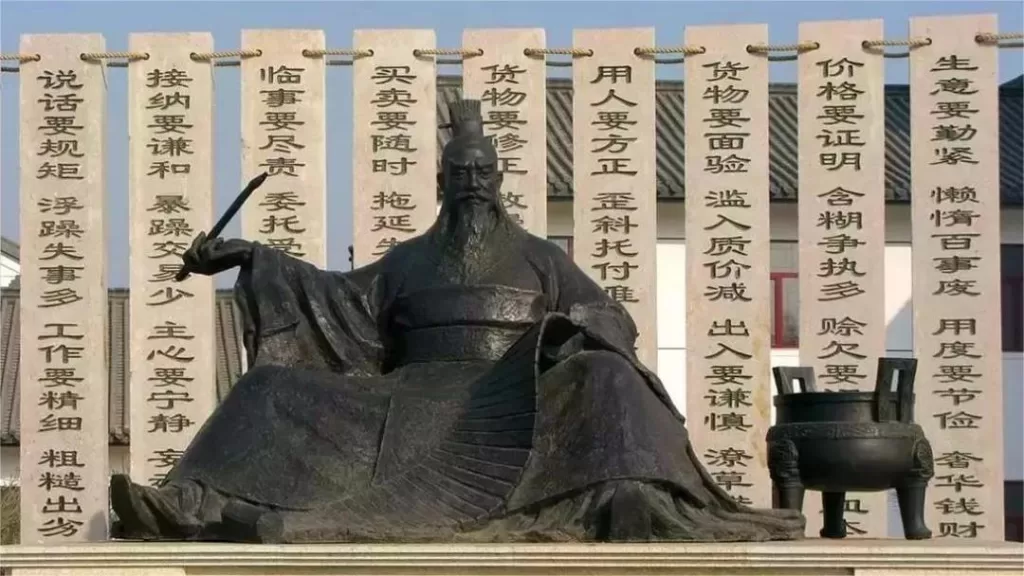Fan Li (范蠡, 536 BC – 448 BC), also known as Shaobo, was a prominent figure in Chinese history, renowned for his multifaceted talents and his significant contributions in the realms of politics, military strategy, economics, and commerce. He hailed from the Huaxia ethnic group and was born into the Chu-Wan Sanhu people, in what is now known as Siwan Town in Xichuan County, Henan Province, although some sources suggest his birthplace was in Wancheng, which is located in the modern Wancheng District, Nanyang City.
Fan Li lived during the late Spring and Autumn period, serving as a high-ranking official in the state of Yue, where he played a pivotal role in assisting King Goujian to restore his kingdom and ultimately conquer the state of Wu. Fan Li’s enduring legacy in Chinese history is often characterized by his various titles, such as “Virtuous Statesman,” “Military Genius,” “Master of Strategy,” “Pioneer of Economics,” and he is also revered by the Chinese people as the “God of Wealth.”
Fan Li held several esteemed positions during his lifetime, including that of Prime Minister (Xiangguo) and Supreme General (Shang Jiangjun) of the Yue state. His most renowned achievement was his instrumental role in advising and supporting King Goujian of Yue in his quest to regain his kingdom from the state of Wu. Fan Li’s strategic counsel, combined with Goujian’s determination, led to the ultimate success of the Yue state over the Wu state. Following this victory, Fan Li decided to retire from the political stage.
One of Fan Li’s notable contributions to the field of literature was the composition of two military treatises, collectively known as “Fan Li’s Art of War” (Fànlì Bīngfǎ). Unfortunately, these writings have been lost to history, and only references to them remain.
Despite his humble origins, Fan Li was a polymath, excelling in both scholarly and martial pursuits. His close relationship with Wen Zhong, the magistrate of the Chu-Wan region, played a crucial role in his journey. Dissatisfied with the political circumstances in Chu, where only aristocrats were allowed to serve in the government, Fan Li and Wen Zhong left for the state of Yue, where they were appointed as senior officials. Fan Li, in particular, held the prestigious title of Prime Minister, assisting King Goujian of Yue in his efforts to rebuild and strengthen the state.
Fan Li’s expertise extended beyond politics and warfare; he was a shrewd economic thinker and a pioneer of business strategies. His contributions to the development of commerce and trade earned him the title of “Saint of Commerce.” His story is a testament to his relentless dedication to improving the lives of the people and eradicating poverty. Fan Li used his considerable wealth to provide assistance to the underprivileged and maintained a modest and unassuming lifestyle.
Fan Li’s crowning achievement was his unwavering support of King Goujian in restoring the state of Yue to its former glory. His strategic brilliance and tactical acumen helped the Yue state overcome the rival state of Wu, which was a significant power during the Spring and Autumn period. The successful defeat of Wu marked a turning point in Chinese history and reestablished Yue as a dominant regional force.
After achieving this momentous victory, Fan Li chose to retreat from public life. He adopted a new identity, taking the name “Chi Yi Zi Pi,” and lived a reclusive life among the peaks of the “Seventy-Two Peaks.” During his self-imposed exile, Fan Li engaged in trade on three separate occasions, accumulating immense wealth each time. However, he chose to distribute his riches to those in need, reinforcing his reputation as a benevolent figure who cared for the welfare of his fellow citizens.
In his later years, Fan Li settled in Taqiu in the state of Song, now part of Heze City in Shandong Province. He adopted the title “Tao Zhu Gong” (Lord of the Pottery Hill) and lived there until his passing in 448 BC, at the age of 88.
Fan Li’s enduring legacy continued through the centuries, and he was posthumously honored in various dynastic eras. During the Tang Dynasty, in the third year of Emperor Dezong’s reign (782 AD), Fan Li was enshrined in the Temple of Martial Achievement and bestowed the title of one of the “Sixty-Four Famous Generals of All Time.” In the Song Dynasty, he was also revered and celebrated in the Temple of Martial Achievement.
Fan Li’s remarkable life and contributions left an indelible mark on Chinese culture and history. His dedication to promoting economic prosperity and his selfless generosity continue to inspire reverence, making him a revered figure in Chinese folklore. He is honored as a deity of wealth, a patron of commerce, and a revered ancestor of the Fan clan, making him a symbol of virtue, wisdom, and prosperity for generations to come.

